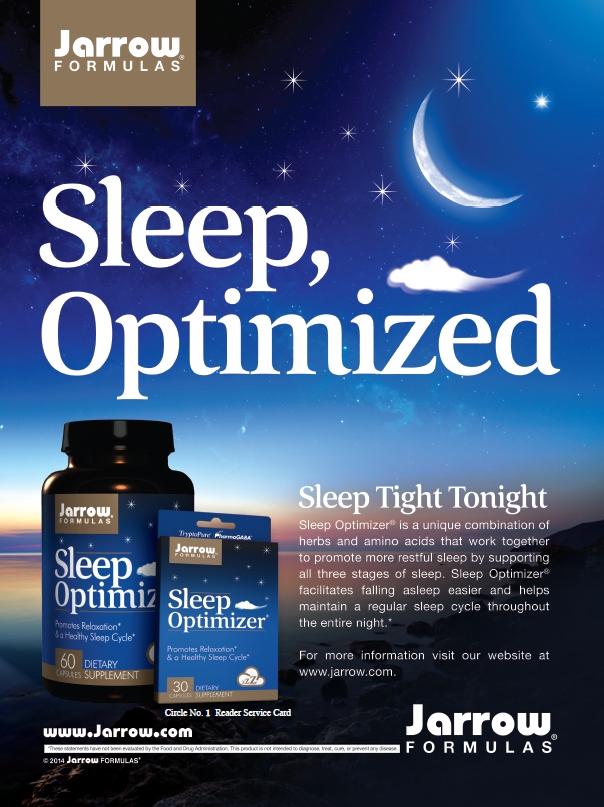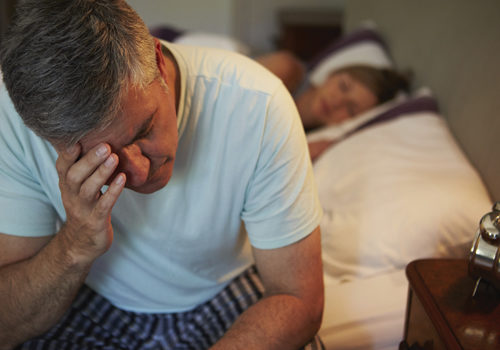Chronic stress usually ends up causing chronic insomnia. Lack of sleep then causes more stress. And there you have it—a vicious cycle with devastating effects. And, it’s not just psychological consequences. I am talking about negative health effects to your heart, brain, skin and even your chances of living a long life.
Managing stress and improving sleep quality really do go hand-in-hand. Both of them must be addressed if we have any chance of avoiding the negative health effects.
Stressor in and Stressor Out—The Way It’s Supposed to Work
The human body is relatively adept at managing acute stressors. Here’s how the stress response is supposed to work:
1. You experience an acute stressor. Thousands of years ago, this could have been a tiger trying to eat you. Today, maybe it’s a child running in front of your car.
2. In response to the stressor, the adrenal glands release cortisol into your bloodstream. Cortisol is the stress hormone that initiates several lifesaving metabolic changes in your body. One of them is an increase in blood sugar.
3. This extra load of blood sugar is used by your brain, heart and skeletal muscles for immediate energy so that you can fight or run or slam on your car brakes.
4. Once the stressor is dealt with, cortisol quickly leaves your system and things return to their normal metabolic state.
However, chronic stress messes up and  “deregulates” the entire stress response. Cortisol remains elevated, blood sugar rises and your metabolism collapses. This is why: At the core of chronic stress is the deregulation of the hypothalamic-pituitary-adrenal (HPA) axis, an interconnected network that governs the production of stress hormones like cortisol, epinephrine and norepinephrine.
“deregulates” the entire stress response. Cortisol remains elevated, blood sugar rises and your metabolism collapses. This is why: At the core of chronic stress is the deregulation of the hypothalamic-pituitary-adrenal (HPA) axis, an interconnected network that governs the production of stress hormones like cortisol, epinephrine and norepinephrine.
Chronic stress leads to “desynchronization” or “deregulation” of the HPA axis and subsequent imbalances in stress hormone levels, a critical feature of stress-related illness and sleep disturbances.
If left unchecked, chronic stress can increase our risk of suffering from a barrage of anxiety- and pressure-related diseases ranging from high blood pressure and dementia to depression. It may even increase our risk for some types of cancer.
Regrettably, while chronic stress produces significant adverse health effects, conventional medicine often relies upon psychoactive drugs to mask stressed patients’ symptoms.
At the same time, mainstream strategies often fail to address biochemical abnormalities, such as imbalanced adrenal hormone levels, that contribute to the detrimental health effects of chronic stress.
A Closer Look at Cortisol
Cortisol is, in many ways, a paradoxical hormone. A certain amount of cortisol is necessary for optimal health, but too much or too little can be unhealthy. As mentioned, during acute episodes of stress, more cortisol is released to help the body cope with physical or psychological stressors.
Its primary functions in the body are:
• Regulation of blood glucose levels by a process called gluconeogenesis in the liver.
• Regulation of the immune system.
• Regulation of carbohydrate, protein and lipid metabolism.
 The result of all of this is to fuel the “flight or fight” anti-stress system. But cortisol plays a role in everyday life as well.
The result of all of this is to fuel the “flight or fight” anti-stress system. But cortisol plays a role in everyday life as well.
During healthy conditions, cortisol levels peak in the early morning hours and dip to their lowest between midnight and 4 a.m. This makes sense. We need to be “stressed” to get out of bed and start our day; followed by “de-stressing” to end our day and eventually fall asleep.
But imagine if this normal fluctuation was reversed or imbalanced. You’d be stressed at night and wide awake, and de-stressed in the morning, unable to get out of bed. Sound familiar?
The Deadly Consequences of Chronic Stress
The consequences of a “deregulated” HPA axis, elevated cortisol and chronic stress can be devastating. A chilling example is stress cardiomyopathy, a spontaneous weakening of the heart that predisposes victims to arrhythmia and even sudden cardiac death.
While the mechanism is not clearly understood, it is thought that chronic stress-induced elevations in epinephrine (adrenaline) over-stimulate the cardiac muscle, altering its function and causing atrial remodeling.
Another striking example is a condition the Japanese refer to as Karoshi (i.e., death from overworking). This condition was recognized in post-World War II Japan. Overworked and severely emotionally and physically stressed Japanese high-level executives suffered strokes and heart attacks at alarming rates at relatively young ages.
Researchers discovered that the death of these otherwise healthy men was due to chronic, unremitting stress. Government estimates in 1990 put the number of men dying each year from Karoshi at over 10,000 (1).
Prolonged stress has been linked with elevated circulating markers of inflammation, and increased intima-media thickness, a measure of atherosclerosis progression (2). Chronic stress considerably increases the risk of anxiety and depression by causing structural and functional changes in the brain as well (3).
Moreover, those who do not properly manage and adapt to chronic stress are more likely to be overweight, develop sexual dysfunction and, of course, have significant disturbances in sleep (4).
The Three States of Stress
According to the “father of stress,” Hans Selye, M.D., the body goes through three states when dealing with stress. The first is the alarm state early on in the process, followed by resistance where the body attempts to adapt to the added stress (release of cortisol), and finally exhaustion, after stress overwhelms and weakens the system (5, 6).
If you reach the exhaustion state, you’ll experience a decline in responsiveness and sensitivity of primary hormonal and neuronal relays of the HPA axis and suffer from hypothalamic deterioration and dysfunction.
The result is a deregulated stress response characterized by erratic stress hormone and catecholamine production and subsequent mood disorders, daytime fatigue and nighttime restlessness and insomnia.
The Exhausted State
So, you’ve exhausted your stress response and your body is exposed to erratic cortisol and catecholamine release. You’re tired during the day and restless at night and soon become sleep deprived, compounding your high level of stress.
The consequences of all of this, especially the sleep deprivation, goes far beyond fatigue and diminished mental and physical performance. Decades of clinical research document that a good night’s rest supports nearly all systems of the body, including your skin health and youthful appearance, healthy collagen formation, insulin levels, healthy body weight, blood pressure, cardiovascular health and a good mood (7–13).
Treating Stress and Sleep Together
There are ways to help promote optimal sleep and reduce stress without a prescription drug. One formula in particular contains three clinically validated, natural compounds shown to support healthy, restful sleep and promote a healthy response to stress.
 The first of the nutrients is milk peptides. I am sure you’ve heard about or have even tried drinking warm milk. It’s supposed to have calming effects and make you sleepy. It turns out this probably is true.
The first of the nutrients is milk peptides. I am sure you’ve heard about or have even tried drinking warm milk. It’s supposed to have calming effects and make you sleepy. It turns out this probably is true.
Milk peptides are small protein fragments formed when milk is heated. These proteins promote relaxation, help with stress and support daytime cognition (14–16). A group of 63 women reporting a variety of sleep-related difficulties experienced as much as 65.6% improvement in their symptoms with just 150 mg per day of milk peptides (17).
In another study, the same 150-mg dose induced substantial improvements across 27 markers of sleep quality and stress response in 165 healthy adults. And in a third study, a group of healthy men and women taking 150 mg per day of milk peptides for one month experienced a 50% improvement in sleep quality after two weeks and needed 30% less time to fall asleep after 4 weeks (18).
The next nutrient, not surprisingly, is a very low dose of melatonin. A compound produced in the brain to regulate the sleep-wake cycle, melatonin levels naturally decline with age and adversely affect sleep patterns in many people. Melatonin has been shown to support sustained and restful sleep.
The last nutrient making up this patented formula is a combination of ashwagandha and Indian gooseberry extracts. Prized in traditional cultures, these plant-based compounds have since gained substantial clinical validation for reducing stress. As an added benefit, they might even help improve the appearance of fine lines and wrinkles. Not bad for two plants!
Indian gooseberry provides broad-spectrum antioxidant support and has been used to preserve youthful skin health and appearance in many skin care products (19).
Ashwagandha promotes a healthy response to stress, yielding 62% relaxation support compared to placebo with just 125 mg per day in one clinical study (20). In a second study, researchers report that supplementing with 600 mg a day of ashwagandha root extract can significantly lower serum cortisol levels (21).
|
Stress and Sleep Supplements Many natural compounds and botanical extracts have been associated with benefits for sleep and stress issues. Individuals should consult a physician before beginning any regimen intended to impact these areas, especially if they are already on medication. Here are few examples. • L-theanine may help induce feelings of tranquility. Studies have shown, however, that it might not be as effective in those already dealing with significant anxiety. |
They recruited 64 people with a history of chronic stress to participate in a randomized, double blind, placebo-controlled trial. Subjects were randomized into two groups, to receive the 300-mg ashwagandha capsules twice a day, or placebo.
The subjects were then followed for 60 days. The primary measurements were serum cortisol and performance on standardized stress scales and questionnaires. Results showed a 27% reduction in cortisol levels and significant changes in the following tests (21): a 44% drop in the Perceived Stress Scale, a 72% improvement in the General Health Questionnaire and a 72% decrease on the Depression Anxiety Stress Scale. The authors concluded that their results validate ashwagandha as a treatment for chronic stress and healthy stress management.
“De-stress” into a Better Night’s Sleep
Easier said than done, right? That may be so, but it doesn’t mean it’s not true. We need to de-stress! Maintaining mental and physical balance in today’s stressful world requires a multimodal approach that encompasses healthy eating habits, getting plenty of exercise, and using innovative natural ingredients to support the bodyal adaptive abilities.
Added to your healthy diet, milk peptides, melatonin, ashwagandha and Indian gooseberry just might be what you’ve been looking for to de-stress. WF
Michael A. Smith, M.D. is senior health scientist with Life Extension in Fort Lauderdale, FL. He is also host of the Healthy Talk radio show on www.RadioMD.com and Life Extension video magazine at www.LEF.org/videomag.


References
1.J Epidemiol Community Health. 2010 Aug;64(8):649-50.
2. Health Psychol. 2012 Mar;31(2):264-8.
3. Ann N Y Acad Sci. 2004 Dec;1032:1-7.
4. Hormones (Athens). 2008 Oct-Dec;7(4):287-93.
5. Stress. 2012 Sep;15(5):472-8.
6. Int J Cancer. 2011 Apr 15;128(8):1989-95.
7. J Invest Dermatol. 2001 Aug;117(2):309-17.
8. The Physiology and Pathophysiology of the Skin. London: Academic Press; 1980:2147-55.
9. Obes Rev. 2009 Nov;10 Suppl 2:37-45.
10. J Clin Sleep Med. 2007 Dec 15;3(7):681-8.
11. Am J Hypertens. 2010 Dec;23(12):1286-91.
12. Prog Cardiovasc Dis. 2009 Jan-Feb;51(4):294-302
13. J Sleep Res. 1997 Sep;6(3):179-88.
14. The Open Sleep Journal 2009, 2, 26-32
15. Eur J Nutr. 2005 Mar;44(2):128-32.
16. Hypertens Res. 2011 Sep;34(9):1035-40.
17. Eur J Clin Nutr. 2007 Apr;61(4):536-41.
18. So Ken Study: Effect of Lactium on sleep disorders. October, 2006.
19. Skin Pharmacol Appl Skin Physiol. 2002;15(5):374-80.
20. JANA. 2008;11(1):50-6.
21. Indian Journal of Psychological Medicine, Vol. 33, Issue 3, pages 255-262
Published in WholeFoods Magazine, September 2014









